Bitcoin
Trump seeks cryptocurrency industry support at bitcoin conference
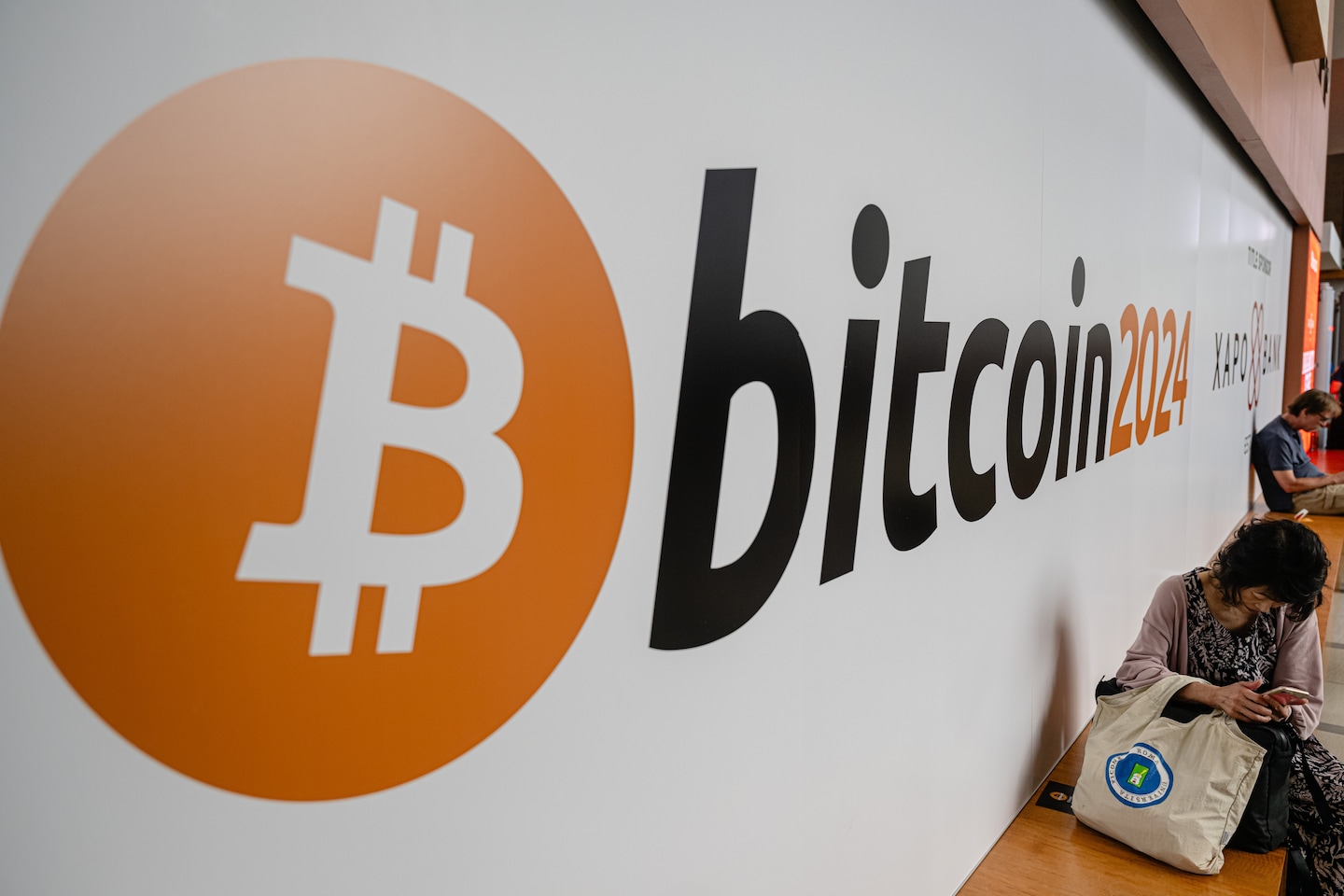
NASHVILLE — There were stacks of orange coins, a crypto-themed stock car and a plethora of miniature rockets meant to embody the hope that prices might shoot “to the moon.”
But the usual trappings accompanied a more political sight at the annual conference that bills itself as the world’s largest gathering of bitcoin enthusiasts: klaxon-red hats emblazoned with the slogan “Make bitcoin Great Again.”
Many of the nation’s leading cryptocurrency companies, executives, investors and fanatics are beginning to unite around former president Donald Trump, hoping their public embrace — and increasingly generous campaign checks — might entice and elect a presidential candidate who will spare the industry from federal regulation.
Under President Biden, the U.S. government has aggressively cracked down on crypto, seeking to protect average Americans from scams and prevent the largely anonymous tokens from enabling illicit activities. But the fierce oversight has chafed crypto advocates and angered wealthy political benefactors in Silicon Valley. To ward off new federal probes, environmental protections and financial regulations, they have gravitated toward Trump — even if they don’t always like him — in the hope that he will deliver relief in Washington.
“I think what people are excited about is, if Trump comes in with a new circle, and Cabinet members, and people, that it’s going to change, and change for the better,” said Marshall Beard, the chief operating officer at Gemini, a crypto trading platform and banking service. He described himself as apolitical, but his company’s founders, billionaire investors Tyler and Cameron Winklevoss, have donated heavily in support of Trump.
Trump has gladly accepted the entreaties: Newly awash in crypto cash, he has celebrated bitcoin and other digital tokens, marking a shift from his time in office, when Trump proclaimed he was “not a fan” of bitcoin and linked such assets to drug sales. The early uptick in fundraising support has troubled some Democrats, who have scrambled to show they are not hostile to the industry.
Trump’s conversion will be on stark display Saturday, when he speaks directly to the thousands of bitcoin owners, traders and investors who have descended this year on Nashville. Many in attendance expect the former president to announce that he wants the U.S. government to stockpile its own reserves of the currency, a radical idea that is bound to send the price of bitcoin skyrocketing — just hours after Trump holds a high-dollar fundraiser with the nation’s crypto elite.
Even before Trump arrived, there were hints of growing support across the sprawling Music City Center. A smattering of “Make bitcoin Great Again” hats — some in bitcoin orange — dotted the rows of booths where crypto entrepreneurs hawked new tokens, investing tips and “tax avoidance strategies,” in the words of one firm, which parked near its kiosk a ruby-red motorcycle adorned with the play on Trump’s slogan. (Staff there declined to be interviewed.)
Outside, a digital sign truck periodically circled, flashing photos of Trump and his new running mate, Sen. JD Vance (R-Ohio), a longtime crypto advocate who has reported owning as much as $250,000 in bitcoin. The vehicle pitched passersby on “MAGA VP,” a type of “memecoin” — unaffiliated with the campaign — that aims to help the former president’s most fervent supporters earn money. It teased that customers who purchased $50 of the token would “win a special prize.”
“At this party, today, it seems like there’s a leaning toward Trump, and I think it’s an appreciation for the first major presidential candidate to come along and say this might be actually a really good idea,” said Mike Belshe, the chief executive of BitGo, which offers a crypto wallet service. He plans to host a fundraiser next week for Vance in Palo Alto, Calif., according to an invite obtained by The Washington Post.
The support for Trump underscored the rapid political awakening underway in the crypto industry. Stung by a series of major scandals — and facing the prospect of tough regulation in Washington — crypto companies, executives and investors have shelled out $121 million this election in a bid to defeat potential foes and elect new friends in Washington, according to the money-in-politics watchdog OpenSecrets.
“We’ve seen tens of millions of dollars pouring in, in an attempt to make sure anti-regulation politicians are the ones who take power,” said Lisa Gilbert, co-president of Public Citizen, a left-leaning watchdog group.
For many crypto titans, the catalyst for action came two years ago, after the downfall of FTX, previously the world’s third-largest crypto marketplace. Many Democrats, including Sen. Elizabeth Warren (Mass.), immediately demanded stringent new rules, while the Securities and Exchange Commission, led by Chairman Gary Gensler, filed a battery of lawsuits alleging the best-known crypto firms had failed to follow basic federal investor protections.
Often, the targets of SEC scrutiny — including Coinbase, a digital asset marketplace, and Ripple, which created the popular XRP token — blasted the cases as evidence of Gensler’s bias against the industry. They coupled their court battles with an expensive lobbying campaign designed to neuter the SEC and stave off other regulations, including rules meant to prevent terrorist groups from trafficking in crypto. And crypto executives and investors began pouring money into the 2024 election, launching three super PACs that have run ads targeting congressional candidates who oppose digital currencies.
This year, David Bailey — the chief executive of BTC Inc., which organized the conference in Nashville — personally approached Trump in the hope he might reverse his views on crypto. Major Silicon Valley donors, including investors David Sacks and Chamath Palihapitiya, hosted lucrative fundraisers for the former president in June. Elon Musk, a crypto booster and owner of X, formerly Twitter, endorsed Trump after the July 13 assassination attempt in Butler, Pa.; the venture capital duo Marc Andreessen and Ben Horowitz soon revealed their support, too.
With every check and endorsement, Trump appeared to grow more receptive. On his social media site, Truth Social, he described himself in May as “VERY POSITIVE AND OPEN MINDED TO CRYPTOCURRENCY COMPANIES.” Two months later, he touted crypto as an official part of the 2024 GOP platform, which declared the party would “end Democrats’ unlawful and un-American Crypto crackdown.”
“If there’s a politician that sees the potential of the industry, and wants it to thrive, generally the voters and donations are going to go in that direction,” said Brian Morgenstern, who oversees policy for the crypto giant Riot Platforms.
Riot is a bitcoin miner: It manages the vast, energy-intensive machines running complex calculations to generate individual tokens. The industry has warred with the Biden administration, and Riot successfully sued the Energy Department after it demanded bitcoin miners turn over data about their energy usage.
Executives from Riot and other companies directly appealed in June to Trump, who told them “he understands quite clearly why people are looking for alternatives to legacy financial systems,” Morgenstern recalled in Nashville this week. Morgenstern served under Trump in the Treasury Department, back when the then-president had been critical of crypto.
After the meeting, Trump commemorated the gathering on Truth Social: “VOTE FOR TRUMP!” he began. “Biden’s hatred of bitcoin only helps China, Russia, and the Radical Communist Left. We want all the remaining bitcoin to be MADE IN THE USA!!!”
Despite his earlier opposition, some crypto devotees seemed to welcome Trump’s attention.
At an unattended expo booth on Friday, the image of a bloodied Trump pumping his fist after the assassination attempt had been altered so he appeared to be holding a bitcoin. Gawkers stopped to snap photos of the rotating illustration, which was superimposed atop the usual rocket logo for Moonshot, a company that manufactures key components for bitcoin mining.
“Hopefully we’re starting to see winds change in the United States, and maybe we’ll get some change with a new president,” mused Ray Kamrath, the chief commercial officer at Bakkt, a crypto trading platform, during a panel discussion later about the future of regulation.
Kamrath expressed hope that the next year might finally resolve the issue of whether some cryptocurrencies are securities, and in the process, shield more of the industry from the SEC.
“Let’s just enjoy for a moment that crypto, bitcoin, is a bona fide election year issue in the United States,” responded Bobby Zagotta, the U.S. chief executive officer of Bitstamp, a crypto marketplace, to a smattering of applause. In an interview afterward, Zagotta said he sensed the “Trump mania just walking the floor.”
A crowd of a few hundred had erupted in celebration a day earlier, when Luke Rudkowski, the founder of the group We Are Change, noted on a panel that Trump had publicly promised to release Ross Ulbricht from prison. A longtime darling of the crypto community, Ulbricht faces a life sentence for convictions related to his creation and operation of Silk Road, a dark web marketplace often used to buy and sell illicit goods.
“It’s happening with Donald Trump; he’s speaking up for it,” said Rudkowski, whose group has been faulted by the Southern Poverty Law Center for spreading conspiracy theories.
Eager to reap the financial benefits of his new, growing base of support, the Trump campaign plans to hold at least two fundraisers in Nashville. To attend the Saturday reception, take a photo with Trump and join his policy roundtable, donors must write checks for $844,600 to his reelection and other Republican campaign committees, according to an invitation obtained by The Post. Already, Trump’s aides have boasted about raising roughly $4 million in various cryptocurrencies, including bitcoin.
Sensing Trump’s fundraising edge, other politicians have looked to court crypto’s cash: On street corners outside the convention hall, Sen. Marsha Blackburn (R-Tenn.) stationed trucks with digital signs that pitched her as a “bitcoin champion” — and directed viewers to a donation website (in dollars or cryptocurrency). Robert F. Kennedy Jr, who is running as an independent in the 2024 presidential race, made his own appeal Friday, telling a packed auditorium he would unveil a host of policies that would see the U.S. government purchase and warehouse bitcoin.
“I’m very happy to learn I’m not the only one talking about bitcoin in this year’s election,” said Kennedy, who appeared at the same conference last year. He later added: “I hope President Trump’s commitment is about more than political expediency.”
But Trump’s inroads in particular have spooked some national Democrats, who do not want to be seen as wholly opposed to crypto. A small group of party officials even huddled privately earlier this month to discuss how to better engage with the politically ascendant industry, having spent years cultivating relationships — and cashing checks — from the broader, liberal-leaning Silicon Valley tech set.
“The challenge the Democrats have is name[d] Gary Gensler,” Mark Cuban, a prominent tech investor, said in an email. “He is pushing a new technology out of the USA. That is not a strong position for a party looking to win.”
Rep. Ro Khanna (D-Calif.), who represents a slice of the Bay Area, convened the gathering with senior aides to Biden and top tech investors including Cuban and Anthony Scaramucci, who served briefly under Trump but since has defected to support Biden and now Vice President Harris. Scaramucci later said that some participants specifically called for firing Gensler and blocking the renomination of Caroline Crenshaw for another term as an SEC commissioner, arguing they have struck an unfairly defiant tone against crypto. The White House did not respond to a request for comment; spokespeople for Gensler and Crenshaw declined to comment.
“I’ll put it simply: After years in the desert, and in a regulatory drought in the Biden administration, I think they see an advocate,” Scaramucci said of Trump.
The outreach has only intensified since Harris replaced Biden as the party’s presumptive nominee, elevating a longtime California politician with deep roots in the tech sector. Some fervent crypto supporters made a last-minute pitch for Harris to appear alongside Trump in Nashville. Her campaign did not respond to a request for comment.
“With the changing of the top of the ticket, it’s an opportunity to reevaluate, reset,” said Brad Garlinghouse, the chief executive of Ripple.
Garlinghouse said he had not yet endorsed or donated to either candidate, but he signaled that many in his industry had supported Trump primarily out of necessity.
“I don’t think this is about choosing one party over another,” he said. “I think the Republicans, led by Donald Trump, are playing chess, and I think the Democrats are playing checkers.”
Bitcoin
Grayscale Unveils Bitcoin Mini Trust ETF
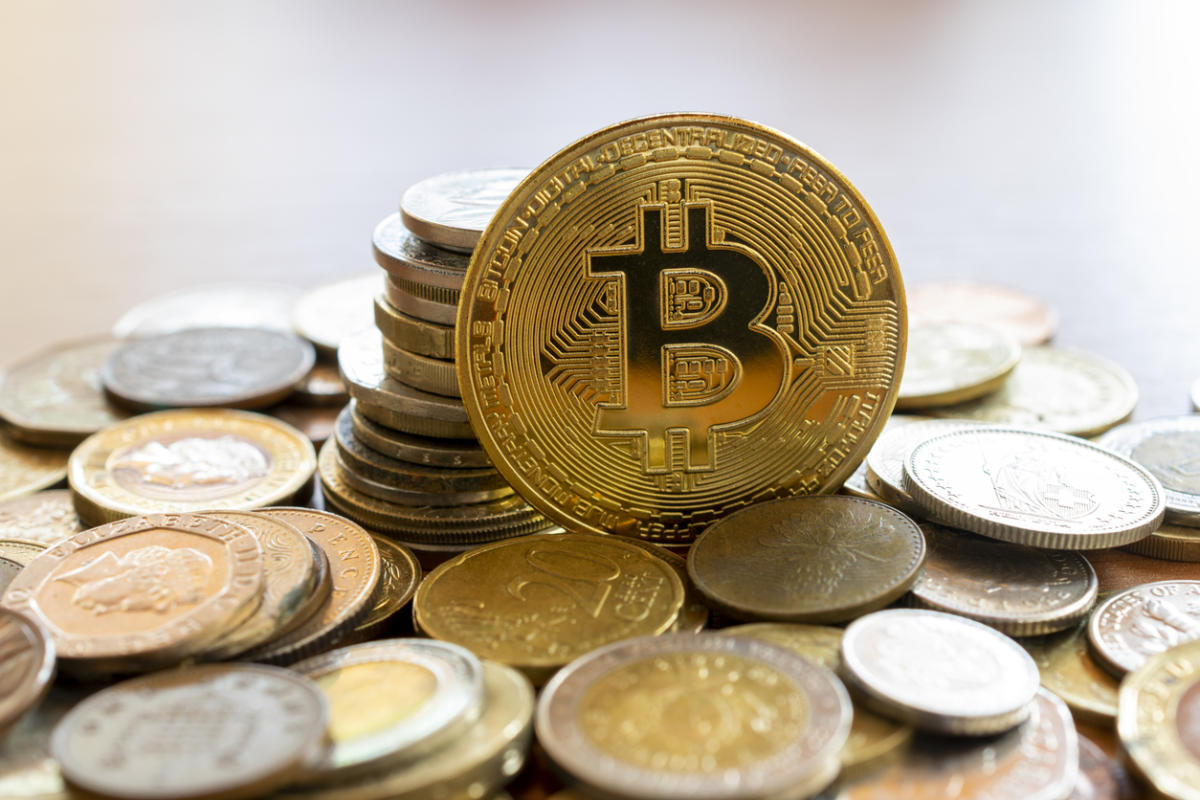
Bitcoin Currency
Grayscale Investments The Bitcoin Mini Trust began trading on Wednesday with a 0.15% expense ratio, offering a lower-cost option for bitcoin exposure in the market.
The Mini Trust, which has the symbol BTC and trades on NYSE Arca, is structured as a spin-off of the Grayscale Bitcoin Trust (GBTC). New shares will be distributed to existing GBTC shareholders with the fund contributing a portion of its bitcoin holdings to the new product. According to a company press releaseBTC’s S-1 registration statement became effective last week.
“The Grayscale team has believed in the transformative potential of Bitcoin since the initial launch of GBTC in 2013, and we are excited to launch the Grayscale Bitcoin Mini Trust to help further lower the barrier to entry for Bitcoin in an SEC-regulated investment vehicle,” said David LaValle, Senior Managing Director and Head of ETFs at Grayscale.
The Bitcoin Mini Trust’s debut comes amid growing interest in ETFs based on the current price of the two largest cryptocurrencies by market cap, bitcoin and ether. Spot bitcoin ETFs have generated nearly $18 billion in inflows since the first ones began trading on Jan. 11, though GBTC has lost nearly $19 billion in assets.
This fund differs from other funds because it is a conversion of an existing fund and has a 1.5% fee, the highest among spot bitcoin products that have received SEC approval this year.
Mini Bitcoin Trust Low Fee
On a Post X On Wednesday, Bloomberg senior ETF analyst Eric Balchunas noted the Bitcoin Mini Trust’s “lowest fee in the category…”
“[Important] to recognize how incredibly cheap 15bps is — about 10x cheaper than spot ETFs in other countries and other vehicles,” Balchunas wrote, adding that this pricing strategy reflects the competitive nature of the U.S. ETF market, which he referred to as the “ETF Terrordome.”
“This is what Terrordome does to fund [cost]. It reaches 1.5% [and] end in 0.15%, how to go from [a] country club to the jungle. But that’s why all the flows are here, investor paradise,” he noted.
Read more: Spot Bitcoin ETF Inflows Hit Daily High of Over $1 Billion
Bitcoin was recently trading at around $66,350, virtually flat since U.S. markets opened on Wednesday.


Grayscale also offers two spot Ethereum ETFs, the Grayscale Ethereum Trust (ETHE) and the Grayscale Ethereum (ETH) Mini Trustwhose performance is based on ETHE. ETHE outflows exceeded $1.8 billion in its first six days of trading, while ETH added more than $181 million in the same period, according to Farside. The remaining seven ETFs generated about $1.2 billion in inflows.
The story continues
Read more: Spot Ethereum ETFs Approved to Start Trading
Permanent link | © Copyright 2024 etf.com. All rights reserved
Bitcoin
Bitcoin (BTC) Price Drops Below $65K After FOMC as Middle East Tensions Rise
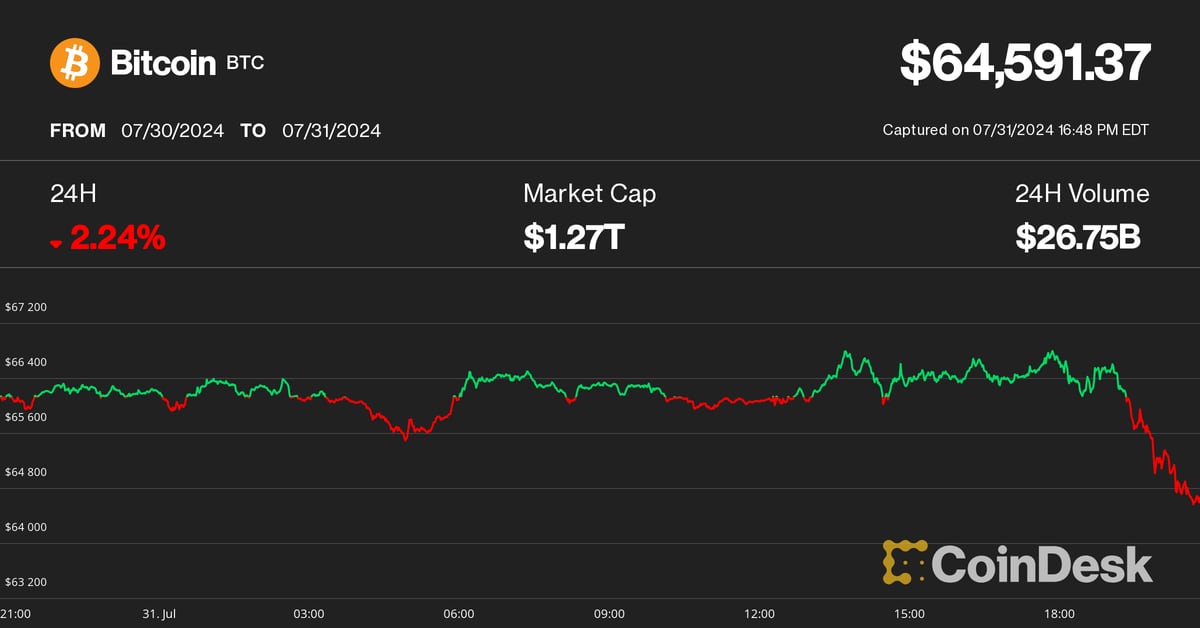
Cryptocurrencies fell sharply on Wednesday as rising geopolitical risks captivated investors’ attention following the conclusion of the Federal Reserve’s July meeting.
Bitcoin (BTC) fell to $64,500 from around $66,500, where it traded following Federal Reserve Chairman Jerome Powell’s press conference and is down more than 2% in the past 24 hours. Major altcoins including ether (ETH)sunbathing (SUN)Avalanche AVAX (AVAX) and Cardano (ADA) also fell, while Ripple’s XRP saved some of its early gains today. The broad cryptocurrency market benchmark CoinDesk 20 Index was 0.8% lower than 24 hours ago.
The liquidation happened when the New York Times reported that Iran’s leaders have ordered retaliation against Israel over the killing of Hamas leader Ismail Haniyeh in Tehran, raising the risk of a wider conflict in the region.
Earlier today, the Fed left benchmark interest rates unchanged and gave little indication that a widely expected rate cut in September is a given. The Fed’s Powell said that while no decision has been made on a September cut, the “broad sense is that we are getting closer” to cutting rates.
While digital assets suffered losses, most traditional asset classes rose higher during the day. U.S. 10-year bond yields fell 10 basis points, while gold rose 1.5% to $2,450, slightly below its record highs, and WTI crude oil prices rose 5%. Stocks also rallied during the day, with the tech-heavy Nasdaq 100 index rebounding 3% and the S&P 500 closing the session 2.2% higher, led by 12% gains in chipmaker giant Nvidia (NVDA).
The different performances across asset classes could be due to traders’ positioning ahead of the Fed meeting, Zach Pandl, head of research at Grayscale, said in an emailed note.
“Equities may have been slightly underutilized after the recent dip, while bitcoin is coming off a strong period with solid inflows, while gold has recovered after a period of weakness,” he said.
“Overall, the combination of Fed rate cuts, bipartisan focus on cryptocurrency policy issues, and the prospect of a second Trump administration that could advocate for a weaker U.S. dollar should be viewed as very positive for bitcoin,” he concluded.
UPDATE (July 31, 2024, 21:30 UTC): Adds grayscale comments.
Bitcoin
Donald Trump’s Cryptocurrency Enthusiasm Is Just Another Scam
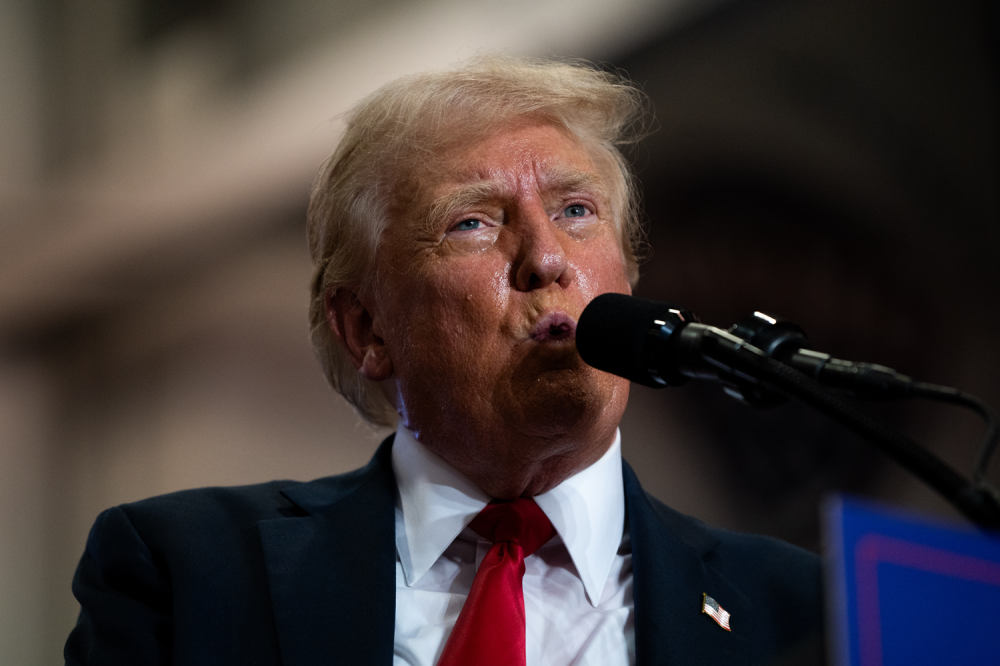
Former US President Donald Trump spoke at the Libertarian National Convention in May and lent his a strong support to crypto: “I will also stop Joe Biden’s crusade to crush crypto. … I will ensure that the future of crypto and the future of bitcoin is made in the US, not taken overseas. I will support the right to self-custody. To the 50 million crypto holders in the country, I say this: With your vote, I will keep Elizabeth Warren and her henchmen out of your bitcoin.”
Former US President Donald Trump spoke at the Libertarian National Convention in May and lent his a strong support to crypto: “I will also stop Joe Biden’s crusade to crush crypto. … I will ensure that the future of crypto and the future of bitcoin is made in the US, not taken overseas. I will support the right to self-custody. To the 50 million crypto holders in the country, I say this: With your vote, I will keep Elizabeth Warren and her henchmen out of your bitcoin.”
Trump continued to court the cryptocurrency industry in the months that followed; he he appeared at the Bitcoin 2024 Conference in Nashville this week, along with independent presidential candidate Robert F. Kennedy Jr.’s parting words to Trump — “Have fun with your bitcoin, your cryptocurrency and whatever else you’re playing with” — were less than enthusiastic, but the industry itself remains packed with ardent Trump supporters.
This turnaround came as a surprise, given Trump’s previous strong opposition to cryptocurrency. When Facebook was floating its Libra cryptocurrency in 2019, Trump tweeted: “I am not a fan of Bitcoin and other cryptocurrencies, which are not money, and whose value is highly volatile and based on thin air.” Former national security adviser John Bolton’s White House memoir, The Room Where It Happened, quotes Trump as telling Treasury Secretary Steven Mnuchin: “Don’t be a trade negotiator. Go after Bitcoin.” [for fraud].” In 2021, Trump counted Fox Business that bitcoin “just looks like a scam. … I want the dollar to be the world’s currency.”
Why the change? There doesn’t seem to be any crypto votes. Trump’s “50 million” number comes from a poorly sampled push survey by cryptocurrency exchange Coinbase which claimed 52 million cryptocurrency users in the United States starting in February 2023. But one survey A survey conducted last October by the US Federal Reserve showed that only 7% of adults (about 18.3 million people) admitted to owning or using cryptocurrencies — down from 10% in 2022 and 12% in 2021. Many of these people are likely wallet owners who were left holding the bag after crypto plunged in 2022 — and are not necessarily new fans.
What Trump wants from the cryptocurrency industry is money. The cryptocurrency industry has already raised more than US$ 180 million to run in the 2024 US elections through his super PACs Fairshake, Defend American Jobs and Protect Progress.
Fairshake spent $10 million on taking Rep. Katie Porter in the primary battle for Dianne Feinstein’s California Senate seat by funding Porter’s pro-crypto rival Adam Schiff. This put $2 million to knock out Rep. Jamaal Bowman in the Democratic primary for New York’s 16th District in favor of pro-crypto George Latimer. In the Utah Senate Republican primary, Rep. John Curtis defeated Trent Staggs with the help of $4.7 million from Defend American Jobs. In Alabama’s House District 2, the majority of campaign expenses came from the cryptocurrency industry.
Fairshake is substantially financed by Coinbase, cryptocurrency issuer Ripple Labs, and Silicon Valley venture capital firm Andreessen Horowitz, or a16z. Silicon Valley was awash in cryptocurrencies during the 2021 bubble, and a16z in particular continues to promote blockchain startups to this day — and still holds a huge amount of bubble crypto tokens that he wishes he could cash in on.
Many in Silicon Valley would like an authoritarian who they think will let them run wild with money — while bailing them out in tough times. Indeed, Trump promised Bitcoin 2024 participants that he hold all bitcoins that the United States acquires. (Never mind that it is usually acquired as the proceeds of crime.) Silicon Valley explicitly sees regulation of any kind as its greatest enemy. Three a16z manifestos — “Politics and the Future” It is “The Techno-Optimist Manifesto” and 2024 “The Small Tech Agenda—describe co-founders Marc Andreessen and Ben Horowitz’s demands for a technology-powered capitalism unhindered by regulation or social considerations. They name “experts,” “bureaucracy,” and “social responsibility” as their “enemies.” Their 2024 statement alleges that banks are unfairly cutting off startups from the banking system; these would be crypto companies funded by a16z.
Trump’s vice presidential pick, Senator J.D. Vance, is a former Silicon Valley venture capitalist. He was once employed by Peter Thiel, who bankrolled Vance’s successful 2022 Senate run; Vance has been described as a “Thiel creation”. He has increased support for the Trump ticket among his venture capital associates. Vance is a bitcoin holder and a frequent advocate of encryption. He recently released a draft bill to review how the Securities and Exchange Commission (SEC) and the Commodity Futures Trading Commission (CFTC) control crypto assets. In 2023, he circulated a bill to prevent banks from cutting out cryptocurrency exchanges.
Minimal regulation has been tried before. It led to the wild exuberance of the 1920s, which ended with the Black Tuesday crash of 1929 and the Great Depression of the 1930s. Regulators like the SEC were put in place during this era to protect investors and transform the securities market from a jungle into a well-tended garden, leading to many prosperous and stable decades that followed.
Crypto provides the opposite of a stable and functional system; it is a practical example of how a lack of regulation allows opportunists and scammers to cause large-scale disasters. The 2022 Crypto Crash repeated the 2008 financial crisis in miniature. FTX’s Sam Bankman-Fried was feted as a financial prodigy who would perform economic miracles if you just gave him carte blanche; he ended up stealing billions of dollars of customers’ money, destroying the lives of ordinary people, and is now in a prison cell.
U.S. regulators have long been concerned about the prospect of cryptocurrency contagion to the broader economy. Criminal money laundering is rampant in cryptocurrency; even the Trump administration has made rules in December 2020 to reduce the risk of money laundering from crypto. Meanwhile, the crypto industry has persistently tried to infiltrate systemically risky corners of the economy, such as pension funds.
Four U.S. banks collapsed during the 2023 banking crisis, the first since 2020. Two of them, Silvergate Bank and Signature Bank, were deeply embedded in the crypto world — Silvergate in particular appears to have collapsed directly from its heavy reliance on FTX and failed a few months after that. Silicon Valley Bank was not involved in crypto but collapsed due to a run on the bench due to panic among venture capital deposit holders, particularly Thiel’s Founders Fund.
Project 2025the Heritage Foundation mammoth conservative wish list The plan, which Trump and Vance have both endorsed and tried to distance themselves from at various times, emphasizes the importance of party loyalists, noting especially financial regulation. The plan recommends replacing as much of the federal bureaucracy as possible with loyalists and “trusted” career officials rather than nonpartisan “experts.” Vance defended in 2021 that Trump should “fire every mid-level bureaucrat, every civil servant in the administrative state” and “replace them with our people.” Loyalty will likely trump competence.
Crypto is barely mentioned directly in Project 2025 — suggesting it has little active support among the broader conservative coalition. But near the end of the manifesto is a plan to dismantle most U.S. financial regulations and investor protections put in place since the 1930s, suggesting the exemption the crypto industry seeks from current SEC and CFTC regulations.
Bitcoin, the first cryptocurrency, started as an ideological project to promote a strange variant of Murray Rothbard’s anarcho-capitalism and the Austrian gold-backed economy—the kind we abandoned to escape the Great Depression. Crypto quickly co-opted the “end of the Fed” and “establishment elites” conspiracy theories of the John Birch Society and Eustace Mullins. It’s a way for billionaire capitalists like Thiel, Andreessen and Elon Musk to claim they’re not part of the so-called elite.
If a second Trump administration were to limp along with financial regulators and allow cryptocurrencies to have free rein, it could help foster the collapse of the U.S. economy that bitcoin claimed to prevent. But Trump is more likely to be happy to take the crypto money and run.
Bitcoin
Trump’s Bitcoin (BTC) Reserve Plan Seen as Just a ‘Small Token Stash’
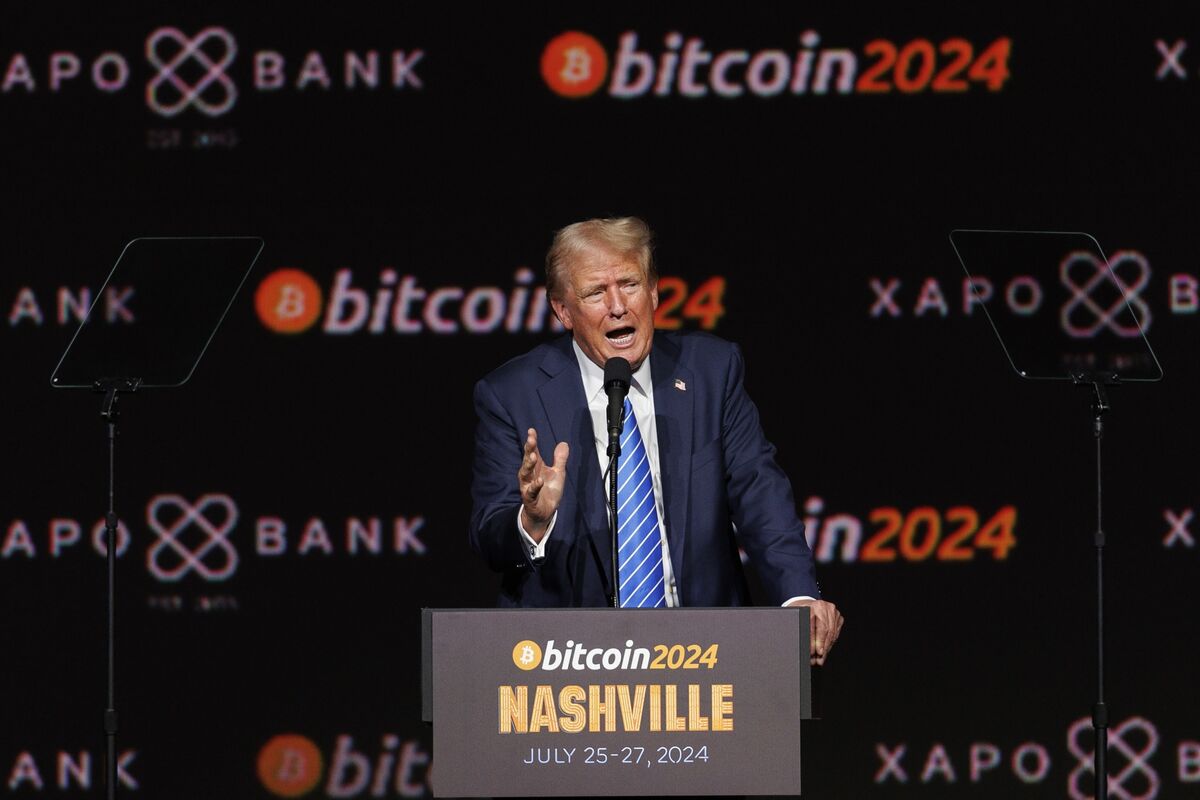
Donald Trump’s recent promise to create a “strategic national stockpile of Bitcoin” may not turn out to be as big a commitment as the hype surrounding the announcement makes it seem.
“Trump’s proposal is extremely modest,” said George Selgin, director emeritus of the Center for Monetary and Financial Alternatives at the Cato Institutea Washington-based public policy group. “It doesn’t have much economic implication.”
-

 Ethereum12 months ago
Ethereum12 months agoEthereum Posts First Consecutive Monthly Losses Since August 2023 on New ETFs
-

 Regulation12 months ago
Regulation12 months agoCryptocurrency Regulation in Slovenia 2024
-

 News12 months ago
News12 months agoNew bill pushes Department of Veterans Affairs to examine how blockchain can improve its work
-

 Regulation12 months ago
Regulation12 months agoThink You Own Your Crypto? New UK Law Would Ensure It – DL News
-

 Regulation12 months ago
Regulation12 months agoUpbit, Coinone, Bithumb Face New Fees Under South Korea’s Cryptocurrency Law
-

 Regulation12 months ago
Regulation12 months agoA Blank Slate for Cryptocurrencies: Kamala Harris’ Regulatory Opportunity
-

 Regulation12 months ago
Regulation12 months agoBahamas Passes Cryptocurrency Bill Designed to Prevent FTX, Terra Disasters
-

 Regulation12 months ago
Regulation12 months agoIndia to Follow G20 Policy for Cryptocurrency Regulation: MoS Finance
-

 News1 year ago
News1 year ago“Captain Tsubasa – RIVALS” launches on Oasys Blockchain
-

 Ethereum1 year ago
Ethereum1 year agoComment deux frères auraient dérobé 25 millions de dollars lors d’un braquage d’Ethereum de 12 secondes • The Register
-

 News12 months ago
News12 months agoEU supports 15 startups to fight online disinformation with blockchain
-

 News1 year ago
News1 year agoSolana ranks the fastest blockchain in the world, surpassing Ethereum, Polygon ⋆ ZyCrypto





